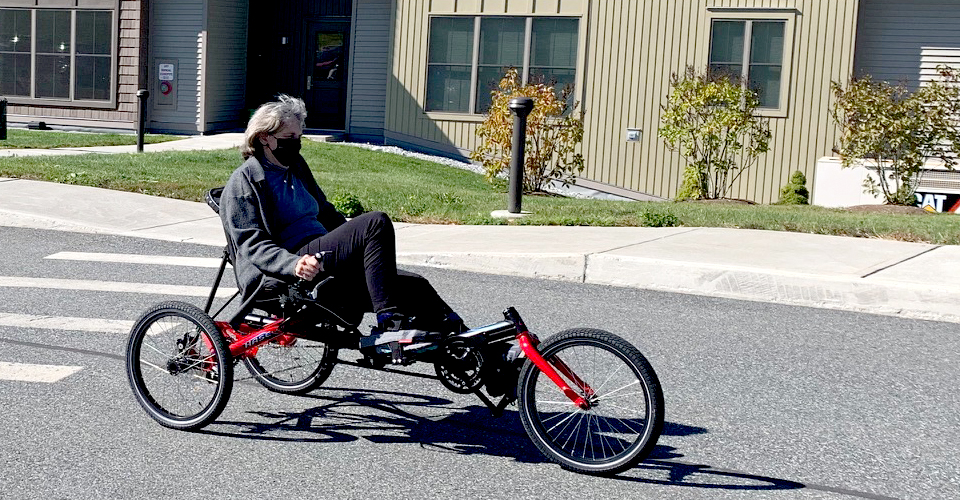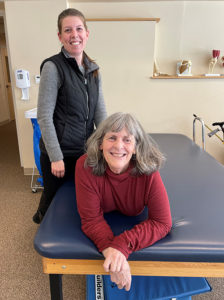

With the strength she rebuilt during physical therapy, Sarah can now enjoy her custom-built recumbent trike.
At 72, Sarah Howell has become accustomed to a life with physical challenges. She was born with cerebral palsy and more recently developed Parkinson’s disease.
After a bad fall, her innate determination and dedication to her physical therapy treatment enabled her to rebuild strength, overcome the worst of her pain, and regain her independence.
It started three years ago when Sarah fell on a hard tile floor. Afterward, she started having trouble bending over to work in her garden, something she hadn’t experienced before. Slowly, different parts of her everyday life became more challenging.
“I couldn’t fix any meals. Bathing was difficult. Home health started coming in to do my laundry,” said Sarah who lives at Gifford’s independent living community in Randolph Center. “Walking was excruciating and getting in bed was pure torture. One night I just couldn’t take it anymore and collapsed on the floor.”
Her worsening balance issues and weakness lead to a stay at Gifford’s hospital. But once there, her health care team became concerned about more than her physical challenges.
“At first we had a hard time figuring out what was making her weak and altering her mental status,” shared Lindsay Haupt, one of the Gifford physical therapists who oversaw Sarah’s care as an inpatient. “At times our team even discussed the likelihood of her going to a nursing home as she couldn’t care for herself independently anymore.”
Lindsay had worked with Sarah previously and knew that cerebral palsy made her body unique and harder to assess. Undaunted, she reviewed Sarah’s history in detail and conducted an extensive physical evaluation. In the end, she became convinced a back issue was the cause of Sarah’s pain, and the medication to treat her pain was contributing to her declining mental state.
It just so happened that Lindsay had recently completed specialized training on treatments for the lower back. The training focused on how long-term posture habits, like sitting and bending forward, could impact the spine and the surrounding nerves. The resulting compression of nerves on the lower back fit nicely with Sarah’s leg weakness and balance issues.

Sarah, with Gifford physical therapist Lindsay Haupt, practicing the back extension exercise that was key to her recovery.
So she gave Sarah a single exercise to try, a back extension (similar to a cobra pose in yoga) to release pressure on her nerves. An unusual step for inpatient physical therapy care, but one that brought about rapid improvement in Sarah’s leg strength and balance.
“This one exercise was the key to her success,” said Lindsay who then consulted with Gifford hospitalist Megan O’Brien on transitioning Sarah to a more traditional rehabilitation facility for further treatment. There Sarah could build on the work she’d begun in the hospital while also weaning herself off the pain medication that was thought to be contributing to her altered mental state.
“I’m very determined because of my cerebral palsy. My Parkinson’s I’m still learning about. But I treat them like people. It works good for me,” says Sarah. “Sometimes it feels like people don’t understand me or what I can or can’t do. But Lindsay believed in me.”
Convinced she could regain her independence, Sarah spent several months in a rehabilitation facility working on back exercises and building her overall strength. She left still using a walker and having trouble moving on her own but she was continuing to grow stronger.
And she wasn’t ready to give up.
When she returned to her home at Strode Independent Living, she arranged for a daily caregiver to help with her meals. She also insisted on receiving outpatient physical therapy with Lindsay at Kingwood Health Center in Randolph.
Kingwood is one of four locations Gifford offers outpatient rehabilitation services, the others are in Berlin and Sharon. Services vary by location but include physical therapy, occupational therapy, and speech therapy.
Sarah and Lindsay have been meeting regularly for over two years now and both are pleased with the results. Today their sessions focus on full-body strengthening while paying a lot of attention to Sarah’s legs and lower back but also continuing to maintain a strong focus on posture.
“I continue to get better. I was kind of amazed actually,” remarked Sarah, who can now move around her apartment unassisted, does her own laundry and cooking, and is even driving again. And she’s convinced that if she keeps at her exercises, she’ll only continue to get better.
“I’m a big believer in physical therapy now, especially because of Lindsay. She listened to me. She knew I knew my own body,” shared Sarah of her relationship with her therapist. “Her knowledge is amazing. Not just her knowledge of the body but in figuring out what’s going on in someone’s head. And it was so great to talk with someone who treats me like a human being, not someone who’s disabled.”
Now that she’s once again fully in charge of her life, Sarah is ready to embark on a new adventure.
“Morgan Orchards was a great place for me to be for the last couple of years as I was recovering. But I’m headed to Rhode Island to work with a specialist my local neurologist recommended me to,” Sarah shared. Though the upcoming move does sadden her as she’ll be saying goodbye to her Strode friends and her relationship with Lindsay. But she’s also full of optimism about her future. And now that she’s once again fully in charge of her life, Sarah is ready to embark on a new adventure.
“It warms my heart to see her reaching her ultimate goal of becoming fully independent,” Lindsay said of Sarah’s progress. “She’s eliminated the need for caregivers and regained her ability to walk to the dining hall at Strode. She even walks around the parking lot and up to Menig Nursing Home next door, sometimes with a walking stick and sometimes without an assistive device at all.”
And though she’s leaving the area, Sarah was quick to compliment Lindsay and her colleagues.
“I would totally recommend her and the rest of Gifford’s team at Kingwood. They’re all young and bright, and very in to what they’re doing,” Sarah said, noting she’ll be looking for a new physical therapist once she’s settled in her new home. “I just hope I can find someone as wonderful as Lindsay in Rhode Island.”
Learn more about Gifford’s Rehabilitation Services.
#
*Direct Access
Per Vermont law, a physician referral is not required for a physical therapist to evaluate or treat a patient, and there are no provisions to treatment. Patients can go directly to physical therapy without a referral from their PCP or specialist. Many insurance programs allow this, but a patient should be sure to check their individual plan as all plans are different.
“Direct Access has been found to save people money and provides a more efficient path for patients to improve their health,” said Gifford Rehabilitation Services Manager Troy Stratton, citing a study on the cost-effectiveness of Direct Access to PT. “And if therapists don’t see progress within the first few visits, they can refer the patient back to their PCP if needed.”

